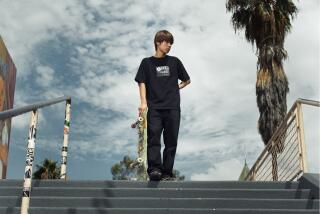Jay Adams dies at 53; legendary skateboarder
Legendary skateboarder Jay Adams, who was one of the edgy “Z-Boys” of the sport featured in the widely heralded 2001 documentary “Dogtown and Z-Boys” and portrayed in the 2005 film “Lords of Dogtown,” died Friday while on an extended surf vacation in Puerto Escondido, Mexico. He was 53.
The cause was believed to have been a heart attack, said his longtime friend, Allen Sarlo.
The surf trip came in the wake of more than two decades of troubles for Adams, who served prison time on drug and assault convictions. “He had really turned his life around,” said Sarlo, who had joined Adams on the vacation.
Adams was not feeling well Thursday night and went to bed early. Early Friday morning, his wife, Tracy, alerted Sarlo and other visiting friends that her husband was choking in his sleep and having trouble breathing. An ambulance took him to a local hospital where he was pronounced dead.
Adams won several championships in skateboarding and surfing, and was renowned for a style so fluid that he was nicknamed “pure seed” and even “the chosen one.” But he mostly shied away from the big-money contests that arose from the sports.
“The thing about Jay was that he never faltered, never caved into corporate involvements,” said Danielle Bostick, co-founder of the World Cup Skateboarding company that oversees major competitions. “He was pretty hard-core.”
His choice to stick close to the renegade side of skateboarding helped make him an icon to those devoted to the sport.
“He was the real deal,” said Sarlo, who grew up with Adams in Venice. “He was the James Dean of skateboarding.”
Adams was born Feb. 3, 1961, the only child of Robert Adams and Philaine Romero, according to the 2004 book “Scarred for Life: Eleven Stories About Skateboarders” by Keith David Hamm. His father was a heroin addict who went to prison when Adams was a baby. He was raised by his mother and Kent Sherwood, a lifelong surfer who made Adams his first surfboard and taught him how to use it.
Jeff Ho, who ran the well-known Zephyr surf shop in Venice that sponsored the Z-Boys skateboarding team, met Adams when they were both surfing. “It was the late 1960s, and he was the youngest kid in the water,” Ho said Friday. “He paddled up to me and said, ‘You’re Jeff Ho, aren’t you? Your surfing is really good.’ ”
“Here he was, one of the young hotshots, and he was paying me a compliment and showing respect. I was impressed.”
Ho was even more impressed with Adams’ moves on a skateboard. “It was not something he had to pick up or work at,” he said. “It just flowed out of him naturally. He was one with the skateboard.”
But as natural as the moves looked, they had a competitive purpose. “He skated with aggression, talent and disregard for what others were doing,” Skip Engblom, who worked with Ho, told the Honolulu Star-Bulletin in 2002. “Skateboarding’s Mozart and Hendrix.”
Hamm wrote that Adams’ low-slung riding style “signaled a paradigm shift from the upright and technically gymnastic trick book held over from skateboarding’s original mid-’60s surge.”
Adams thrived on the camaraderie of the skateboarding subculture that included a lot of partying. “We were on summer vacation for 20 years,” he said in the “Dogtown and Z-Boys” documentary. But while others built careers from the sport — Tony Alva became well known for designing skateboard decks, and Stacy Peralta directed the documentary and wrote the “Lords of Dogtown” feature — Adams’ life went off track.
While taking care of his mother when she was dying of cancer in the mid-1990s, according to Hamm, he began taking her pain medication. He was living in Hawaii at the time with his girlfriend and son, Seven, going to church on Sundays and selling dope on the side.
He later had a daughter, Venice.
Adams served 21/2 years of a 10-year sentence for drug possession in Hawaii and earned his high school diploma in prison. Before that, he served six months for his involvement in a fight in Hollywood that resulted a man’s death.
Even when not in trouble with the law, Adams kept his distance from the skateboarding mainstream that increasingly embraced rules, regulations and the TV spotlight of the X Games and Olympics. “It all got too serious,” he said in the documentary. “It stopped being fun.”
With his legal troubles finally behind him in recent years, he seemed to be finding a measure of peace. “He was down in Mexico, I think, to work on his surfing, get healthy, get stronger,” Ho said.
Sarlo said Adams had gotten serious about religion and read the Bible every morning before surfing. He was having such a good time on the several months-long surfing trip that he invited Sarlo and other friends to join him.
The day before he died, he seemed content.
“I saw him catch this big wave and ride it all the way through,” Sarlo said. “He told me this was the best surf trip of his life.”
More to Read
Start your day right
Sign up for Essential California for the L.A. Times biggest news, features and recommendations in your inbox six days a week.
You may occasionally receive promotional content from the Los Angeles Times.








